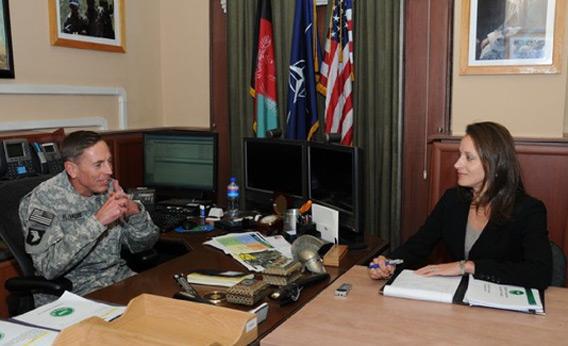Gen. David Petraeus resigned as director of the Central Intelligence Agency on Friday after admitting to a romantic relationship with his biographer, Paula Broadwell. Have many biographers had affairs with their subjects?
Not that we know of. Broadwell probably isn’t the first biographer to carry on a sexual relationship with a high-profile subject at the height of his or her fame, but she is the first to be caught. Other cases are largely in the realm of rumor and unsubstantiated gossip. The best example is Doris Kearns (now Kearns Goodwin), who spent many hours interviewing Lyndon B. Johnson at his Texas ranch. The author probably didn’t help matters by admitting that LBJ liked to climb into her bed for interviews. But she insists that she never joined the former president in bed, and there is no evidence that a romance occurred.
Trying to gain access while remaining independent is the central struggle in writing a biography. When asked what moves an author to write a biography, author Leon Edel responded, “It’s a little like falling in love. … The love affair, however exhilarating, has to be terminated if a useful biography is to emerge.” Goodwin wrote of her Johnson biography, “I had to learn how to distance myself, in order to describe both his ruthless power … and his vulnerability.” Perhaps the most common critique of biographies about living subjects is that they are fawning, because the writer loved the subject too much. In his New York Times review of Walter Isaacson’s book on Steve Jobs, which came out just after Jobs’ death in 2011, Joe Nocera noted that Isaacson “didn’t just interview Jobs; he watched him die. … How can one possibly get critical distance about your subject when such moments are part of your experience of him?” Even before her affair with Petraeus became public, some critics dismissed Broadwell’s book as hagiography.
Having a sexual relationship with someone doesn’t disqualify you from becoming his or her biographer, but it’s usually disclosed. Spousal biographies, for example, are quite common. Constanze Mozart co-wrote a biography of her first husband, Wolfgang, with her second husband, Georg Nissen. (Nissen died before completing the book, making him the second husband to widow Constanze with a major piece of work unfinished.)
Journalists have historically been more likely than biographers to carry on concealed sexual relationships with their subjects. Harvard Business Review editor Suzy Wetlaufer began a romantic relationship with former General Electric CEO Jack Welch a decade ago after he agreed to be profiled in the magazine. The affair ended Wetlaufer’s tenure and Welch’s 13-year marriage. Welch and Wetlaufer eventually married. In the 1970s, Philadelphia Inquirer journalist Laura Foreman had an affair with Philadelphia politician Henry J. “Buddy” Cianfrani, who was convicted of corruption during the period she was reporting on him. Sports reporter Samantha Stevenson had a relationship with Julius Erving in the late 1970s, but the affair didn’t become public until Alexandra Stevenson, their daughter, reached the 1999 Wimbledon semifinals.
Journalistic codes of ethics emphasize independence and credibility, which would prohibit a sexual relationship between a journalist and a subject. Whether journalists may have affairs with sources who are peripherally related to an article or ongoing coverage is a more difficult question that most newsrooms seem to approach on a case-by-case basis.
Got a question about today’s news? Ask the Explainer.
Explainer thanks Paul John Eakin, editor of The Ethics of Life Writing, and Bob Steele of DePauw University.
